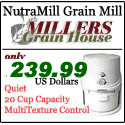|
|
10 Tips on How to Look for the Good Bread
Callie Armstrong
1. Go for grains. Don't think twice and stick with whole grain varieties, including whole wheat, multigrain, rye, millet, oat bran, oat, and cracked wheat. This goes for all types of bread: sliced bread, pita, bagels, English muffins, crackers, and so on.
2. Be very careful, "wheat" bread sound just as healthy as "whole wheat" bread but it's merely a blend of white and whole wheat flour. Remember that a product labeled "whole wheat" must be made from 100 percent whole wheat flour.
3. Choose breads with at least 2 grams of fiber per slice.
4. If you're looking to save calories, try the whole wheat, reduced-calorie bread (approximately 40 calories per slice with 2 grams of fiber).
5. Take advantage of the fiber that some cereals pack in, and choose varieties that have at least 2 grams of fiber per serving. You can usually (not always) get a sense of whether a cereal has fiber from the name on the box (Bran Flakes, All- Bran, 100%25 Bran, Raisin Bran, Fiber-One, Shredded Wheat, and Corn Bran).
6. Don't be fooled. Some cereals pack in more sugar and salt, check the Total Carbohydrates against the Sugars (on the nutrition label) to make sure sugar is not a main ingredient. In fact, opt for the brands that report 6 grams of sugar or less per serving. If your kids (or spouse) insist on the sugary brands, mix it with half a bowl of a healthier look-a-like (for instance, half Frosted Flakes and half Bran Flakes).
7. Check the serving size. Some of the denser, heavier cereals only allot a miniscule amount for one serving. Take this into consideration if you plan to eat a normal size bowl (and you're watching your weight). Remember, double the serving size means double the calories.
8. Don't forget to throw some hot cereal into your cart. Whether you opt for the instant or the kind that requires cooking, stick with unsweetened varieties of oatmeal, grits, cream of rice, and cream of wheat. You can sweeten them with some of the fresh fruit you bought in the produce section.
9. Most cereals are low in fat with the exception of granola and others that add nuts, seeds, coconut, and oils. Read the label and choose cereals with no more than 2 grams of fat per serving.
10. Read the list of ingredients on your cereal box and make sure that wheat, rye, corn, or oats are listed first. Items are listed in the order of quantity.
Callie Armstrong is a writer for http://www.AllergyHero.com. Her insights on dieting, exercise and health can be read at http://www.body4beach.com
|
Our Food Supply is in Peril! Watch this
Video...
WE RECOMMEND

Here are even more informative articles on milling grains and whole wheat.
Whole Grains Are Good For You
Breadmaker Recipes
Diabetic Gains From Nutritious Whole Grains
Baking Ideas for Summer Foods

Nutrimill
Multi-Texture High Speed Grain Mill
BEST
PRICE Available! New and innovative
variable high speed grain mill. Mill grains and beans
into fresh flour in minutes. Get
More Information and Secure ORDER HERE See
Our Special! |
|